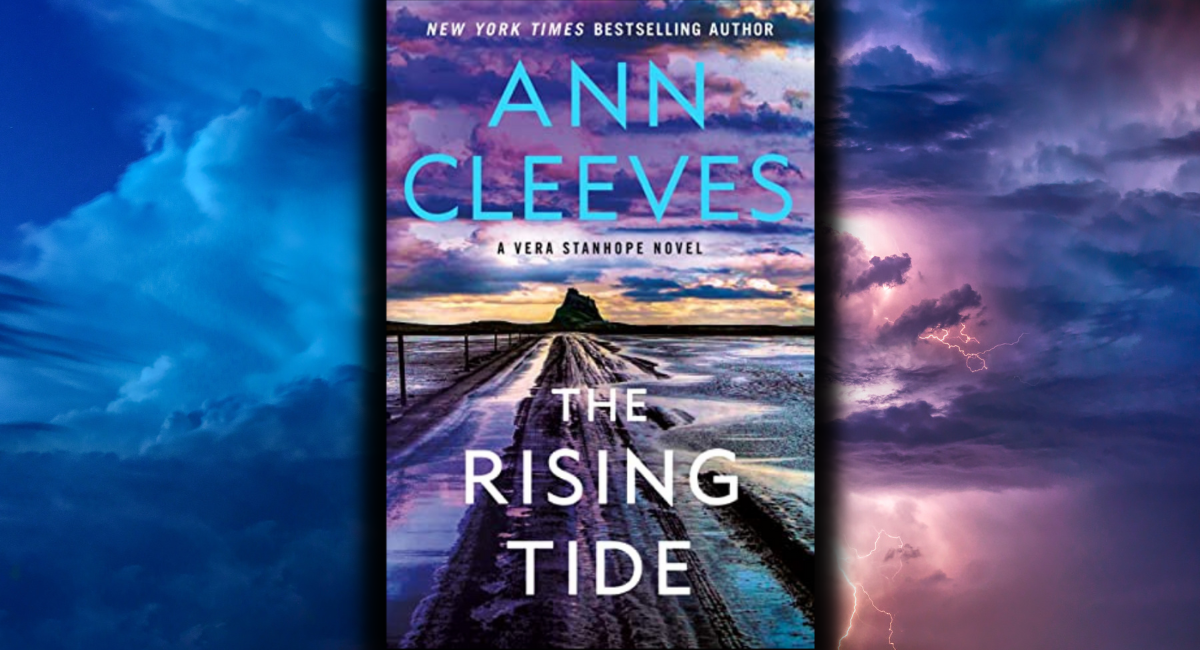The Rising Tide by Ann Cleeves
Feisty and Disheveled DCI Vera Stanhope returns for her eleventh North Umberland investigation in Ann Cleeves’ chilling new novel, The Rising Tide (Minotaur Books). Set on a tiny tidal island off the mainland, a group of friends gather to celebrate the fiftieth anniversary of a school holiday retreat called “Only Connect.” They have encamped at Pilgrim’s House on Holy Island — a small, isolated retreat operated by nuns on the remote island.
The five friends — Rick, a television journalist, Annie, a gourmet food purveyor, Phillip, a retired priest and Ken, an Alzheimer’s victim, and his wife, Louisa — have returned to relive the glory days of their friendships, parties and booze as they do every five years. But shortly after the first midnight, the reunion takes a dark turn when it is discovered that one guest has died by hanging. Worse, the victim was the glue holding this motley group together despite their personal and professional challenges. Initially, the diagnosis of suicide seems reasonable until Vera Stanhope is enlisted to investigate and discovers evidence of foul play.
FOUL PLAY AMONG FRIENDS
With the crime scene far from home and the island made inaccessible by the tide, Vera and her team find themselves setting up camp in a local hotel. In a classic “keep your enemies closer” mindset, Vera uses the opportunity to observe her suspects’ relationships and interactions, looking for possible motivations for the reunion gone wrong. With friends, coworkers, and even children present, Vera and her team will rule no one out until they find the killer.
But Vera’s investigation dredges up terrible memories of the tragic death of another student who attended the first reunion over twenty-five years ago, and an ancient infanticide investigation. Vera can’t help but think that there is a connection between the two historic deaths with the present homicide, but is she correct? And why was the victim killed now? What was the motive for the crime? And when one character falls prey to sexual misconduct allegations in the workplace, in an allusion to the #MeToo movement, could the inappropriate workplace behavior have even been a motive for the crime?
The Rising Tide is a complicated revelation of lies, jealousies, liaisons, guilt, financial relationships, betrayals and secrets that have been festering for a half-century. Even the closest of friends and spouses have been keeping secrets from each other, especially from Vera and her team. DCI Stanhope knows rules can be stretched to the breaking point, and she will go the distance to fight for victims unable to fight for themselves. And in The Rising Tide, she knows that “everything important to this case had happened in the past.”
A VISCERAL READ FOR CRIME FANS
Cleeves paints a vivid, visual picture of the remote holiday island. It is winter; a time full of cloudy skies, pounding turf, gulls circling overhead, and locals gathering at the local pub exchanging stories. Cleeves’ depiction is so fined-tuned that the readers feel as though they are alongside Vera as she tramps through the grasslands of a holiday camp on the trail of a killer. The Rising Tide is a treat for the senses and the mind.
The Rising Tide cements Ann Cleeves’ place among crime writers, who seamlessly blend intriguing characters, unusual settings, intricate plotting, and brisk pacing to keep readers turning the page. Let’s hope the author never permits DCI Vera Stanhope to retire her old, ratty Macintosh. She would be sorely missed.
EXCLUSIVE INTERVIEW: A QUARTET OF QUESTIONS FOR ANN CLEEVES
Your beloved and befuddling DCI Vera Stanhope is a master at wheedling out deep, dark secrets from the witnesses in her cases. Over the series, readers have come to know Vera well, but what secret does Vera keep close to her heart that she’s never shared with anyone?
I don’t think she shares many personal experiences with her colleagues. They probably don’t know that she was neglected by her father after her mother died, that he was an alcoholic and that he flouted the wildlife laws by stealing birds’ eggs for profit. That background made her who she was.
The settings of your novels are so unique and become characters in your stories. What inspired you to write about a North Umberland tidal island in The Rising Tide? Is it a real or fictional location?
Holy Island, known to people from outside Northumberland as Lindisfarne, is a real place, and people do get caught by the tide. There was a great piece earlier this week in the New York Times about the history and geography of the place — great timing!
In The Rising Tide, a murder occurs at a fiftieth reunion, which implicates friends and loved ones of the deceased. One character is a journalist accused of bullying his female colleagues. Were the character’s actions inspired by the #Metoo Movement, and if so, what statement are you making about the inequality of women in the workplace?
It was triggered by the #MeToo movement. I think I wanted to explore the nuances of older men’s responses to the movement. My generation never called them out to make us feel uncomfortable. I’m not talking about sexual assault here, but the sniggers and the pressure to do things that we weren’t quite sure about. I wonder if we were, in some way, complicit for not having the courage to make a fuss then.
In The Rising Tide, a murder occurs at a fiftieth reunion, which implicates friends and loved ones of the deceased. It appears the male characters represent successes in their respective fields, while the women are struggling with self-identity and are more burdened by the past. What are you saying about the struggles of women in today’s society? And for your female characters?
I’m not sure that this is true. Lou has been a successful headteacher, while her husband Ken was rather a plodder. Philip is a priest, but struggling with his faith. Annie might not have a professional career, but she loves working in the deli. There are, I think, different kinds of success.
About Ann Cleeves:
Ann Cleeves is the author of the books behind ITV’s Vera, now in its third series, and the BBC’s Shetland, which will be aired in December 2012. Ann grew up in the country, first in Herefordshire, then in North Devon. After dropping out of university she took a number of temporary jobs – child care officer, women’s refuge leader, bird observatory cook, auxiliary coastguard – before going back to college and training to be a probation officer.
While cooking in the Bird Observatory on Fair Isle, she met her husband Tim, a visiting ornithologist. In 1987, Tim, Ann and their two daughters moved to Northumberland and the northeast provides the inspiration for many of her subsequent titles.
For the National Year of Reading, Ann was made reader-in-residence for three library authorities. It came as a revelation that it was possible to get paid for talking to readers about books! She went on to set up reading groups in prisons as part of the Inside Books project, became Cheltenham Literature Festival’s first reader-in-residence and still enjoys working with libraries.
Ann’s short film for Border TV, Catching Birds, won a Royal Television Society Award. She has twice been short-listed for a CWA Dagger Award – once for her short story The Plater, and the following year for the Dagger in the Library award. In 2006, Ann Cleeves was the first winner of the prestigious Duncan Lawrie Dagger Award of the Crime Writers’ Association for Raven Black, the first volume of her Shetland Quartet. The Duncan Lawrie Dagger replaces the CWA’s Gold Dagger award, and the winner receives £20,000, making it the world’s largest award for crime fiction.
Ann’s books have been translated into sixteen languages. She’s a bestseller in Scandinavia and Germany. Her novels sell widely and to critical acclaim in the United States. Raven Black was shortlisted for the Martin Beck award for the best-translated crime novel in Sweden in 2006.





